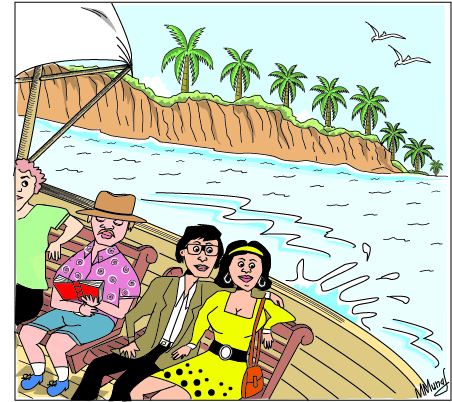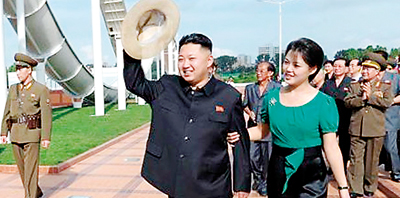A slow boat to England
On August 15, 1964, I sailed to England on a Government scholarship on a ship owned by Aristotle Onassis, the richest man in Greece. He ran a shuttle service to Australia ferrying mainly housewives and minor labour from Greece. He also owned oil tankers (and later, married the wife of John F. Kennedy, President of the USA.) The ship was anchored in the old Colombo harbour and my wife and I had to take a small boat and climb the perilous gangway in the dark.
There were other Sri Lankans, students from the Arts Faculties also on scholarship, an obstetrician on retirement, and a father taking his two daughters to Lourdes, all booked by a Greek travel agent. I had thought it interesting to go by sea and arranged passage with Thomas Cook in Colombo. The journey took 16 days.

When we boarded, dinner had been served and the purser gave us sandwiches. Though we had first class tickets, we were on a deck way down below, amidst the Greek labourers, in a tiny cabin with a porthole. There were two bunk beds on top of each other. My wife was seasick all the way.
I roamed all over the ship (and organised a farewell concert of harvesting paddy, singing a kavi, the night before disembarking.) I remember a huge brawny butcher; a charming retired hospital matron and an advertising executive. We sat together for meals, mostly noodles, tomato ketchup, buns, small packets of butter and cheese, and mounds of salad. The butcher sat with me, and I was amazed by the mountain of food on his plate.
The Greeks did not speak English. They were loud and noisy except for a fellow wearing a black hat silent like a psychopath sitting alone on deck always in the same place. I was scared he would steal up behind me and suddenly flip me overboard! It was late in the night when we arrived at Aden and passengers had to buy things in the dark, stepping dangerously on boats crowding the sides of the ship. I bought a cheap camera, a coloured film roll and a portable tape-recorder when we docked at Suez the next day. The Greeks bought a lot of things – radios, plastic kitchenware, dolls etc –
The next morning was a cacophony. Sailing down the Suez Canal was very interesting watching from the bow. I saw the red sand of the Sinai desert on the right, green fields, date palm-trees and people riding camels on the left. This was to be a last time for the Six-day war with Israel began and Nasser sank ships in the Canal blocking it for a long time.
I had trouble with the Greek tour guide from the start – because he ignored my first class ticket. The ship docked at Piraeus and we stayed there for three days, went on a tour of Athens, saw the famous ruins, and eventually to Benghazi on a dirty steamer. Here too my wife and I were put in a tiny cabin down below. Next to us was an Australian vet with his wife. He had a stomach ache and the wife urgently consulted me. I gave aspirin and verbal therapy. It worked magic! The wife insisted in paying but I refused.
While in Athens, I sent what I assumed, by my hand signals at the post office, an air letter to my brother to meet me in London. We travelled in the Rapido Express through Europe and were taken to the Vatican, and saw also the ancient arena of the gladiators etc. While on the train, in a second-class berth, I asked the travel agent to refund my ticket. There was a row and he threatened to throw me out.
At Calais, he whispered something to the Port Health Officer who took my wife and me to a room and examined us for malaria! We almost missed the train to London and did not know anything about our baggage.
The train arrived at Victoria Railway station after midnight. Relatives met my fellow passengers and soon my wife and I were alone in that huge place. There was no baggage. I suddenly saw a forlorn suitcase at the far end of the platform. The last train from Dover had dumped it there. There was no sign of my brother.
My wife was in tears. I remembered a friend and went to the phone booth. To my horror, there were not only numbers but also letters! I read the instructions carefully and dialled the operator and told him: “I am a doctor. This is my first visit to your country. I want to contact a friend (Dr. Kingsley Ratnanather at Bexley Hospital) but I do not know his number or how to telephone from this booth”. This was my inaugural experience of courtesy and British efficiency. He told me to wait. After a minute or so he rang, told me to put 25p and press the button. Kingsley came on line immediately and asked me to wait there. I looked up from the booth and saw a huge clock on the roof and told him that I shall be under the clock, when to my horror I saw several!
I began to flit from clock to clock lugging the suitcase. Kingsley came with his wife in about an hour, and we soon ate hot rice and curry at his house but were shocked to find the bed-sheet and covers freezing cold, as if taken out of the fridge!
Kingsley fixed me a locum job at the hospital.
I travelled with a chauffeur doing psychiatric clinics. I returned to it after my exam, and a few days before returning home, went to Regent Street to buy an electric Singer sewing machine that was heavily advertised. The agent sold me what I assumed was a new one but when I went to my flat discovered I had been tricked with a used one. I typed a letter to Singer Headquarters and threatened to complain to Scotland Yard for investigating fraud in business. The manager drove to Bexley Hospital, apologized profusely, assured he will ship a brand new machine, invited my wife for lessons and asked her to practise on the old one till then.
I am now 80 and thought of sharing these experiences of a forgotten age.
Follow @timesonlinelk
comments powered by Disqus





















